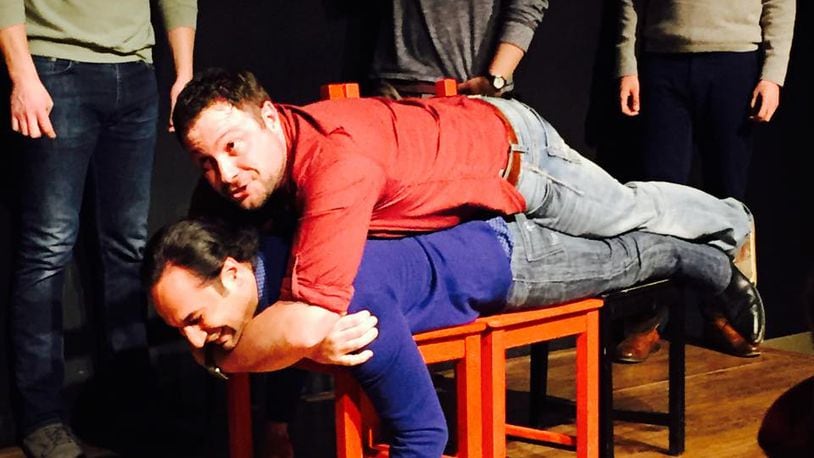When I attended a show at Black Box Improv Theater in downtown Dayton, there was a portion of the show where anyone can come up and try some improv. Justin Howard, owner of Black Box, approached me between sets and said I should give it a try. With that, I finally had the chance to get back to acting.
After one of the main weekend performances came to a close, a handful of others and I took turns jumping on the stage with Eric Spencer, one of the regular performers. I took the stage ready to knock off the cobwebs from years of not performing. I shake my limbs carelessly, trying to shake off mounting nerves.
We are set to go as soon as Spencer asks the audience to shout out a one-word suggestion. “Flamingo,” someone blurts out. A little unorthodox, but we can make it work.
The scene starts with my partner and I acting as flamingo models. My attempt to stand in a flamingo-esque position is an utter failure. Spencer comes to the stage, pretending to be someone who hired us. He looks us up and down, mocking how we look. I snap back, telling him he thought I looked good as a flamingo model just last night.
From that point, the scene takes turns that lose track of itself. Overall, I bombed throughout the whole skit. I flopped around trying to come up with lines and struggled to keep the momentum rolling in the right direction. There were some chuckles from the onlookers, mostly due to Spencer. In the end, the flamingo modeling scene never quite took off.
But I was going to learn how to be better on stage – I was about to embark on improv lessons. My six-week long classes were taught by Andrea M. Fantacone, one of the regular weekend performers. Having graduated in the very first improv class in Black Box’s history, Fantacone has been teaching for the past few years. His experience and knowledge was going to be beneficial.
Throughout the level one course, my classmates and I learned how to properly start scenes. First, we had to learn how to establish what's called "baseline reality" during our skits. By getting a one-word suggestion from Fantacone, we set the who-what-where of the scene. Once the baseline reality is set, we begin to gain knowledge of discovering what is called "the game."
The interesting, unique or strange thing about the scene that involves the characters is what makes the game. With the baseline reality rolling and the game announced, we start letting it rip. Some classes focused on specific skills, like acting with imaginary props that allowed us to enhance the scene – and all without any lines.
In order to get loose, Fantacone would start every class by playing a few improv games. I’m not talking about the games that were mentioned earlier – these games forced us to look and listen to one another. Improv is about being wholly aware of what others are saying and doing. If you don’t listen to what your partner is telling you, the scene becomes disjointed and eventually unfunny. One game we played was “3 Lines.” Here, you and a partner establish as much as you can as fast as you can with just three lines.
Another game was a circled riff off to some degree, much like one featured in the movie Pitch Perfect. The class formed a circle while one person stood in the middle. That person would start singing a song and the rest of us would sing along. When a classmate got a song ready in their head, they would tap out the person in the middle and start the new song.
After several classes to lay down the fundamentals, we begin working on our level one show. The show starts off by asking the audience to suggest a word. Once it's chosen, the party starts a monologue based on it. Other performers would carry out scenes based on what they took out of the unscripted story.
With each passing week, we became more comfortable. Less apprehensive to take an idea and run with it. We built trust with one another. Personally, I felt the song game was one of the moments that truly got us to start trusting one another. In improv, trust is crucial – without it, the audience won't buy into what you're doing onstage.
The week of the show, we felt confident that we could put on a great performance. I no longer was thinking about the night when I bombed. I learned what I did wrong and was eager to get back on stage and perform in front of live audience. I yearned to have that flamingo scene recreated, this time with better results. But I realized that having that sketch go off the rails was a blessing in disguise. Without it, I wouldn't be so attentive to how I could become better. I wouldn't have felt the need to work on perfecting the craft. Fantacone had prepped us to be our best, and that's what I wanted to concentrate on.
The day finally comes: the level one performance show at the Black Box. We do a quick run-through before the crowd fills the theater. Fantacone instructs us to start walking toward the green room after executing a few scenes. The music blares from the speakers, and the spectators make their way in.
It starts to sink in for all of us when we enter the small quarters.
We are about to go live.
How will Tommy’s live performance go? To find out, come back to Dayton.com for his final story in this series.
About the Author
